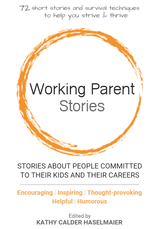|
Assuming that a person's future family status is unknown (i.e. they are not yet married):
Does it ever make sense to give different career advice to boys/men vs girls/women? Serious question. Let us know what you think.
0 Comments
Disclaimer: This info is intended for people who are able to make general plans for their career in advance. It may also be helpful for people considering a career change.
Some people say that their job doesn't pay enough for them to be able to afford childcare. Or, to be more specific, their job doesn't pay enough for them to be able to meet the needs of their family, including childcare costs. Before you make plans to launch a career (and possibly incur the expenses associated with educating yourself for that career), find out which jobs don't pay enough to enable you to support a family (including childcare costs) and avoid those careers! It's also smart to avoid educational expenses that lead to careers that don't pay enough to enable you to repay student loans if you need them. The good news is that it's often possible to do something you will enjoy most days, without pursuing low paying jobs. For example, if you love teaching, but fear that being a school teacher won't pay enough to support the lifestyle you desire, consider becoming a corporate trainer which usually pays well. Or if you want to work with children, consider becoming a speech-language pathologist which can involve teaching children outside a traditional classroom. When people pursue jobs that pay well, in addition to meeting their own needs and enjoying the freedom that comes from some level of financial flexibility, they also help people in low paying jobs by lowering the supply of people pursuing those lower paying jobs. Basic economics teaches us that when supply becomes scarce, wages rise. And wages usually rise faster when supply is reduced than they do by complaining, striking, or attempting to legislate pay rates. Avoiding future frustrations takes planning and hard work, but it usually pays off in the end. By the time my husband and I decided to marry we’d already determined that he could cook better than I could, he cared more about food than I did, and he was happy to take on a permanent role, at least for the foreseeable future, as “chief nutrition officer” within the family we were planning to establish. So I literally found it funny (at least I hope I laughed) when his mother informed me that I would need to make his dinner after we were married because he would be very tired when he came home from work. The reason this was so funny was that we worked together. We met at work, we had similar roles and the same level of responsibility at work, we’d earned sort of similar degrees (mechanical engineering and computer science), and we had similar plans for the future (i.e. we both wanted to have children, raise a family and pursue our careers). So it really did strike me as funny that she mentioned he’d be tired at the end of the day. I remember thinking, and knowing me I probably said, “I think we’ll both be tired at the end of the day!” A few years later we were excited when I became pregnant. (And boy was I tired at the end of those days.) Lots of people asked me, “Are you going to work after the baby is born?” To be fair, I wasn’t sure. I wanted to work after the baby was born, but had heard so many stories, even from co-workers with children, about how hard it is to come back to work after having a baby because you just miss the baby so much, so I decided to keep my options open. After getting advice from an experienced mother and colleague, I told my employer that I would definitely be returning, but my husband and I agreed I would stay home if that felt like the better option. I loved my baby before she was born, so actually assumed nobody would find it harder to return to work after giving birth than me. The thing was, I did love my baby. A lot. Maybe more than any mother ever. But I also wanted to return to work, so I gave it a try. In order to ease my transition, my husband stayed home with our daughter for the first month after I returned to work. And I was OK. The baby seemed OK too. Even my husband was OK. So we tentatively decided to see if we could make it work. Two years ago, and two days after our little bundle of joy turned 26, I finally decided to let up at work, and I retired. I share this story because it highlights the fact that we don’t encourage men and women in the same ways when it comes to careers. Nobody ever told my husband that he should take on more work at home because I’d be tired after working all day, and nobody ever asked him (like not even one person) if he planned to return to work after our baby was born. To be clear, I’m not blaming anybody for anything. When things change and cultural norms shift, people have questions and sometimes they even ask them. That’s OK. It’s good. And it’s how we make progress. But, when we criticize women for pursuing careers with the same intensity as men and question their devotion to their children and families when they make the same career choices as men, we send them messages. Make no mistake about it. And those messages causes some women (but not all) to ease up, step back, and sometimes even drop out. And when that happens, and we all know that it happens, women’s ability to compete in the workplace is diminished. Companies, or at least the people who work at them, start to wonder if any given woman is really in it for the long haul. And many of the very capable women who could help close the wage gap, drop out of the game completely. It’s hard to be paid the same as a man if you’re not even getting paid. Anyone who is serious about wanting to close the wage gap, who thinks that their sons and daughters deserve the same pay when they deliver the same value, has got to help close the encouragement gap first. If you’re a woman who thinks that women deserve to be paid the same as men when they deliver the same value, start by staying in the game. If you’re an employer who wants to be able to say that you’re paying women the same as men when they deliver the same value, find ways to help your women employees understand that their contributions are valued and actually helping them become better parents. If you’re a man who isn’t afraid of competing with women when proving your value in the work place, find ways to mentor women who are interested. Change is never easy. That’s why we admire the people who make it happen. Be one of those people; a changemaker. Let’s close the encouragement gap. That may go a long way toward closing the wage gap.
Related Stories:
|
The StoriesArchives
March 2022
Categories
All
|
Photos from barnimages.com, marcoverch, truewonder, donnierayjones, marcoverch, shixart1985, Gustavo Devito, edenpictures, nan palmero, quapan, The Pumpkin Theory, bark, opassande, Semtrio, Ivan Radic (CC BY 2.0), verchmarco (CC BY 2.0), Didriks, shawnzrossi, shixart1985 (CC BY 2.0), madprime, marksmorton, CT Arzneimittel GmbH, NwongPR, franchiseopportunitiesphotos, anotherlunch.com, jdlasica, wuestenigel, Frinthy, romanboed, Doris Tichelaar, quinn.anya, A_Peach, VisitLakeland, MEDION Pressestelle, Darren Wilkinson, bratislavskysamospravnykraj, Anthony Quintano, Danielle Scott, pockethifi, Bridgette Rehg, Martin Pettitt, PersonalCreations.com, wuestenigel, Thad Zajdowicz, archer10 (Dennis) 139M Views, Infomastern, beltz6, The National Guard, futurestreet, daveynin, OIST (Okinawa Institute of Science and Technology), Rinet IT, shixart1985, mikecogh, JeepersMedia, Ryan Polei | www.ryanpolei.com, Jake.Christopher., aleksandrajovovich, thepeachpeddler, wwward0, flossyflotsam, Got Credit, Senado Federal, Corvair Owner, lookcatalog, moodboardphotography, dejankrsmanovic, Carine fel, ElleFlorio, {Guerrilla Futures | Jason Tester}, greg westfall., Arlington County, mariaronnaluna, quinn.anya, wuestenigel, Tayloright, insatiablemunch, MrJamesBaker, Scorius, Alan Light, Monkey Mash Button, www.audio-luci-store.it, wohlford, Vivian Chen [陳培雯], okchomeseller, BoldContent, Ivan Radic, verchmarco, donnierayjones, Czar Hey, US Department of Education, Andrew Milligan Sumo, Michel Curi, anotherlunch.com, ProFlowers.com, Cultural viewpoints from around the world, alubavin, yourbestdigs, Rod Waddington, Tayloright, Wonder woman0731, yourbestdigs, donald judge, Thomas Leth-Olsen, Infinity Studio, shixart1985, wuestenigel, francesbean, Roger Blackwell, MrJamesBaker, Luca Nebuloni, MFer Photography, erinw519, boellstiftung, North Carolina National Guard, A m o r e Caterina, MrJamesBaker, bellaellaboutique, Free For Commercial Use (FFC), Prayitno / Thank you for (12 millions +) view, wuestenigel, Matt From London, MadFishDigital, Kompentenzzentrum Frau und Beruf, mikecogh, CreditDebitPro, marciadotcom, Mr.Sai, _steffen






 RSS Feed
RSS Feed